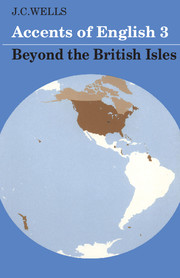9 - The imperial legacy
Published online by Cambridge University Press: 05 June 2012
Summary
There are several parts of the world where English is spoken as a first language by very few of the local inhabitants, but where a historical background of British or American colonization or empire has meant that English plays an important national rôle as a second language. Some such places have, furthermore, developed characteristic local varieties of English.
It could be argued that Indian and African accents of English qualify for inclusion in a work about mother-tongue accents no more than do French or Russian accents of English. Like them, their phonetic characteristics are to be accounted for almost entirely in terms of interference from the patterns of the native language. The justification for admitting some brief discussion of these ‘post-imperial’ accents is that they are characteristic of English as a second language rather than as a foreign language. They are used in countries where English is an official language, or the official language, of the state. In the South Asian subcontinent, and in ‘anglophone’ black Africa, English is widely used in administration, for secondary and higher education (sometimes even for primary education), in political life, and in commerce. Indians use English for communicating with other Indians, Africans use English for communicating with other Africans. In France, on the contrary, the language used for all the purposes just mentioned is French, and Frenchmen use English only for communicating with foreigners; and so with Russia.
- Type
- Chapter
- Information
- Accents of EnglishBeyond the British Isles, pp. 623 - 651Publisher: Cambridge University PressPrint publication year: 1982



